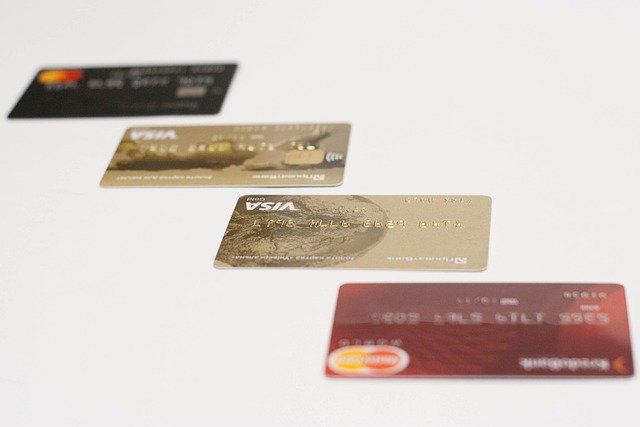The Hidden Truth About Business Credit Cards in 2025 — Why More People Qualify Than You Think
Business credit cards are no longer reserved for established companies with traditional financial profiles. In 2025, qualification standards have evolved significantly, opening opportunities for freelancers, gig workers, and entrepreneurs who might have previously assumed they didn't meet the requirements. Understanding these changes can help you access valuable financial tools that support growth, manage cash flow, and earn rewards on everyday business expenses.

The landscape of business credit cards has transformed dramatically over recent years. What was once a financial product exclusively available to corporations and established businesses has become increasingly accessible to a broader range of professionals. Sole proprietors, freelancers, and small business owners are discovering that they may qualify for business credit cards even without traditional business structures or extensive credit histories.
How Business Credit Cards Are Opening Doors for Freelancers and Small Owners
Freelancers and small business owners face unique financial challenges that business credit cards can help address. These cards provide separation between personal and business expenses, simplify tax preparation, and offer rewards programs tailored to common business spending categories. In 2025, card issuers have recognized the growing gig economy and adjusted their qualification criteria accordingly. Many freelancers working as independent contractors, consultants, or creative professionals now find themselves eligible for business credit cards that were previously out of reach. The key shift involves how issuers evaluate business legitimacy and income verification. Even if you operate under your own name without a registered business entity, you can often apply using your Social Security number instead of an Employer Identification Number. This flexibility has removed a significant barrier for solo entrepreneurs who generate income through platforms like Upwork, Fiverr, or direct client relationships.
Why Some New Programs Don’t Require Traditional Income Proof
Traditional business credit card applications once demanded extensive documentation including tax returns, profit and loss statements, and business bank account records. However, innovative underwriting models have changed this approach. Some issuers now leverage alternative data sources to assess creditworthiness, including payment histories with vendors, digital transaction records, and even social media business presence. This evolution stems from recognition that many legitimate businesses operate informally, especially in their early stages. Startups and side hustles may not have years of tax returns to present, yet they represent viable business activities with regular income streams. Forward-thinking card issuers have developed application processes that accommodate these modern business realities. Instead of requiring comprehensive financial documentation upfront, some programs use stated income models where applicants self-report their business revenue. While this information may be verified later, the initial application process becomes significantly more accessible. This approach acknowledges that business income can fluctuate and that newer ventures deserve access to credit tools that help them grow.
Exploring How Everyday People Use Business Cards for Growth and Rewards
Business credit cards offer practical benefits that extend beyond simple payment convenience. Everyday entrepreneurs leverage these cards strategically to maximize rewards, build business credit profiles, and manage cash flow during irregular income periods. Common use cases include purchasing inventory, paying for advertising campaigns, covering travel expenses for client meetings, and subscribing to essential software services. The rewards structures on business cards often align with typical business spending patterns. Categories like office supplies, internet and phone services, shipping costs, and advertising frequently earn elevated rewards rates. For a freelance graphic designer, this might mean earning extra points on Adobe Creative Cloud subscriptions and client presentation materials. For a small e-commerce seller, enhanced rewards on shipping and advertising spend can add up to significant annual savings. Beyond rewards, business credit cards help establish a business credit profile separate from personal credit. This separation becomes increasingly valuable as businesses grow and seek additional financing. Regular, responsible use of a business credit card builds a credit history under your business name, which lenders review when considering loans, lines of credit, or lease applications. Many cardholders also appreciate the extended payment terms that business cards provide, effectively offering short-term financing for business expenses without interest charges when balances are paid in full each billing cycle.
Understanding Qualification Criteria That Work in Your Favor
While business credit cards have become more accessible, understanding what issuers look for can improve your approval chances. Personal credit scores still play a significant role, as most business card applications require a personal guarantee from the business owner. However, the credit score thresholds vary considerably across different card products. Some business cards designed for newer businesses accept applicants with fair credit scores in the mid-600s, while premium rewards cards typically require good to excellent credit in the 700+ range. Business revenue requirements also vary widely. Some cards have no stated minimum revenue requirement, while others may look for annual business income of at least a few thousand dollars. The good news is that many issuers consider gross revenue rather than net profit, meaning your total business income before expenses counts toward qualification. Time in business represents another factor, though requirements have relaxed. While some premium cards prefer businesses operating for at least two years, many cards welcome applicants who have been in business for just a few months or are even in the planning stages of launching a venture.
Comparing Options to Find the Right Fit
With expanded access comes increased choice, making it important to compare business credit card options based on your specific needs and spending patterns. Different cards excel in different areas, from cash back rates to travel rewards, introductory offers to ongoing benefits. Consider factors like annual fees, rewards categories, sign-up bonuses, employee card policies, and integration with accounting software when evaluating options. Some cards charge no annual fee, making them ideal for businesses watching every expense, while premium cards with higher annual fees may deliver greater value through enhanced rewards and perks for businesses with substantial spending. The application process itself has become more user-friendly, with many issuers offering instant decisions or approval within minutes for qualified applicants. This speed reflects improved digital underwriting systems and the simplified documentation requirements discussed earlier.
Moving Forward with Confidence
The democratization of business credit cards represents a positive development for entrepreneurs at all stages. Whether you’re launching a side hustle, growing a freelance practice, or expanding a small business, these financial tools offer tangible benefits that support your goals. The key is understanding that qualification standards have evolved to reflect modern business realities and that you may be eligible even if you don’t fit the traditional corporate profile. Before applying, assess your personal credit standing, gather basic information about your business revenue and structure, and research cards that align with your spending patterns. With the right approach and realistic expectations, you can access business credit cards that help separate your finances, earn valuable rewards, and build a stronger financial foundation for your entrepreneurial journey. The hidden truth is simply this: business credit cards are no longer hidden behind insurmountable barriers, and more people than ever can benefit from what they offer.




